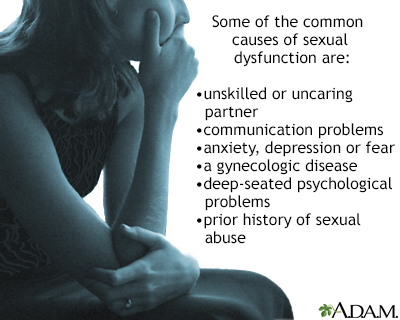Women and sexual problems
Frigidity - self-care; Sexual dysfunction - female - self-care

Female sexual dysfunction describes women who are indifferent or hostile to sexual intercourse, who have no response to sexual advances or stimulation, or who are unable to have an orgasm during sexual intercourse.
Common Sexual Problems
You may have sexual dysfunction if you are distressed by any of the following:
- You rarely, or never, have a desire to have sex.
- You are avoiding sex with your partner.
- You cannot get aroused or cannot stay aroused during sex even if you want sex.
- You cannot have an orgasm.
- You have pain during sex.
Common Causes for Sexual Problems
Causes for sexual problems may include:
- Getting older: a woman's sex drive often decreases with age. This is normal. It can be a problem when one partner wants sex more often than the other.
- Perimenopause and menopause: You have less estrogen as you get older. This can cause thinning of your skin in the vagina and vaginal dryness. Because of this, sex may be painful.
- Illnesses can cause problems with sex. Illnesses like cancer, bladder or bowel diseases, arthritis, and headaches may cause sexual problems.
- Medicines: Some medicines for blood pressure, depression, and chemotherapy can decrease your sex drive or make it hard to have an orgasm.
- Stress and anxiety
- Depression
- Relationship problems with your partner.
- Having been sexually abused in the past.
How to Make Sex Better
To make sex better, you can:
- Get plenty of rest and eat well.
- Limit alcohol, drugs, and smoking.
- Feel your best. This helps with feeling better about sex.
- Do Kegel exercises. Tighten and relax your pelvic muscles.
- Focus on other sexual activities, not just intercourse.
- Talk to your partner about your problem.
- Be creative, plan non-sexual activities with your partner, and work to build the relationship.
- Use birth control that works for both you and your partner. Discuss this ahead of time so you are not worried about an unwanted pregnancy.
How to Make Sex Less Painful
To make sex less painful, you can:
- Spend more time on foreplay. Make sure you are aroused and have natural vaginal lubrication and secretions before intercourse.
- Use a vaginal lubricant for dryness.
- Try different positions for intercourse.
- Empty your bladder before sex.
- Take a warm bath to relax before sex.
What to Expect at Your Office Visit
Your health care provider will:
- Ask you about your relationships, current sexual practices, attitude towards sex, other medical problems you might have, medicines you are taking, and other possible symptoms.
- Do a physical exam, including a pelvic exam
Treatment
Get treatment for any other medical problems. This may help with problems with sex.
- Your provider may be able to change or stop a medicine. This can help with sexual problems.
- Your provider may recommend that you use estrogen tablets or cream to put in and around your vagina. This helps with dryness.
- Your provider may refer you for psychiatric evaluation if you have signs or symptoms of depression which can contribute to decreased sex drive.
- If your provider cannot help you, they can refer you to a sex therapist.
- You and your partner may be referred for counseling to help with relationship problems or to work out bad experiences you have had with sex.
When to Call the Doctor
Contact your provider If:
- You are distressed by a problem with sex.
- You are worried about your relationship.
- You have pain or other symptoms with sex.
Contact your provider immediately if:
- Intercourse is suddenly painful. You may have an infection or other medical problem that needs to be treated now.
- You think you may have a sexually transmitted infection. You and your partner will want treatment right away.
- You have a headache or chest pain after sex.
References
Bhasin S, David SR. Sexual function and dysfunction. In: Melmed S, Auchus RJ, Goldfine AB, Rosen CJ, Kopp PA, eds. Williams Textbook of Endocrinology. 15th ed. Philadelphia, PA: Elsevier; 2025:chap 18.
Gerber D. Sexual problems. In: Magowan B, ed. Clinical Obstetrics and Gynaecology. 5th ed. Philadelphia, PA: Elsevier; 2023:chap 19.
Kocjancic E, Iacovelli V, Acar O. Sexual function and dysfunction in the female. In: Partin AW, Dmochowski RR, Kavoussi LR, Peters CA, eds. Campbell-Walsh-Wein Urology. 12th ed. Philadelphia, PA: Elsevier; 2021:chap 74.
Rowen TS, Simon JA. Sexual dysfunction in the female. In: Robertson RP, ed. DeGroot's Endocrinology: Adult and Pediatric. 8th ed. Philadelphia, PA: Elsevier; 2023:chap 128.
Version Info
Last reviewed on: 11/8/2024
Reviewed by: LaQuita Martinez, MD, Department of Obstetrics and Gynecology, Emory Johns Creek Hospital, Alpharetta, GA. Also reviewed by David C. Dugdale, MD, Medical Director, Brenda Conaway, Editorial Director, and the A.D.A.M. Editorial team.
